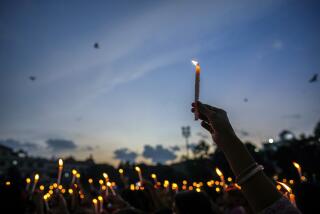India prosecutors seek death penalty in bus gang rape
NEW DELHI -- An Indian court on Wednesday heard sentencing arguments in the case of four men convicted a day earlier of raping and murdering a 23-year-old physiotherapist in December, with the prosecution arguing that leniency would be a travesty in such a heinous crime and defense attorneys citing extenuating circumstances.
The sentence is to be handed down Friday in a case that has shocked, angered and transfixed India.
As convicted murderers, the defendants face either life in prison -- which in practical terms can mean as little as 14 years in India -- or the death sentence. Cries for harsh punishment have been intense in recent months, including by protesters outside the court, even though India rarely executes death-row prisoners. ââHang Themâ Chorus Grows,â read a headline on the local NewsX television network.
On Tuesday, the court found guilty four of the six defendants, age 19 to 35, on all 13 charges they faced, including rape, murder and kidnapping. A fifth suspect reportedly killed himself in prison, although his parents claim it was murder. The sixth, a juvenile at the time, was given the maximum three-year sentence in a youth rehabilitation center.
The case has been something of a tipping point as public outrage trumped inertia over how women are often treated in India, leading to a tougher rape law, fast-track courts and national soul-searching. The details of the case, anger at perceived government inaction and the fact that many Indians could see themselves, their wives or daughters in the victim sparked strong passion across the country.
Born into a poor family in northern Uttar Pradesh state, the victim attended college with money from the sale of the familyâs farm, studied hard and moved to New Delhi in pursuit of a promising career and better life.
On Dec. 16, after watching a movie at an upscale mall, she and a male friend boarded what they thought was an ordinary white commuter bus. As the bus drove through posh neighborhoods in the capital, she was gang raped and both were assaulted with iron rods before being tossed onto the road naked. She died of internal injuries in a Singapore hospital two weeks later.
The six accused gang members -- including unemployed Akshay Kumar Singh, gym instructor Vinay Sharma, fruit-seller Pawan Gupta and drivers Mukesh Singh and his now-deceased brother, Ram Singh -- are in many ways a mirror image of the victim. They also came from poor families and most migrated to the big city in search of opportunities. But like millions of migrants, these proved largely out of reach given a lack of education or skills.
The sixth, the then-juvenile who hasnât been named under Indian law, left his village at age 11 for New Delhi, surviving on low-end restaurant jobs and as a bus ticket-taker, according to police reports. He never returned home, and his mother told local media she assumed he was dead.
In a three-hour hearing Wednesday, the prosecution laid out its case for why all four men should be executed, essentially arguing that there should be no mercy for convicts who showed such little mercy toward their victim.
âThere can be nothing more diabolic than a helpless girl put through torture,â said Dayan Krishnan, the chief prosecutor, according to a media pool report, as police officers held the four menâs hands, a common security practice in India where handcuffs are often seen as demeaning. âThis is an extreme case of depravity.â
Arguing against leniency, Krishnan cited the precedent of Dhananjoy Chatterjee, a security guard hung in 2004 for the rape and murder of a 14-year old girl in March 1990 as she returned from school. This was the last execution in India in a rape-and-murder case, carried out after his mercy plea was rejected.
Attorneys for the four defendants then laid out what they said were extenuating circumstances deserving of life imprisonment, arguing that this was a spur-of-the-moment crime and not premeditated. Under Indian law, the death penalty is reserved for the ârarest of rareâ cases, a somewhat ill-defined standard.
âThe court must bear in mind that life imprisonment is the rule, and the death sentence is the exception,â said Vivek Sharma, a defense lawyer for one of the men, arguing in favor of life imprisonment. âJudges should never be bloodthirsty.â
Among the mitigating factors cited by Guptaâs lawyer, representing the youngest defendant, were his relatively young age of 19, his clean record, the fact that he could be rehabilitated and that he is the sole breadwinner caring for elderly parents. He also argued that Gupta was under the influence of alcohol at the time of the attack. Given that heâll face at least several years in jail, it wasnât immediately clear how he would contribute to his familyâs income.
Other defense attorneys argued that their clients werenât in New Delhi at the time, that they were in the capital but not on the bus or that they were on the bus but were driving and didnât participate in the attack.
âI am begging for your mercy on behalf of his mother,â said V.K. Anand, Mukesh Singhâs lawyer. âPunish him for what he has done. Donât punish him for what he has not done. He was only driving the bus.â
ALSO:
Colombia, Nicaragua spat anew about disputed waters
Many in Congress unswayed by Obamaâs speech on Syria
1 in 4 men surveyed in Asia-Pacific say they committed rape
Tanvi Sharma in the New Delhi bureau contributed to this report.
More to Read
Sign up for Essential California
The most important California stories and recommendations in your inbox every morning.
You may occasionally receive promotional content from the Los Angeles Times.










